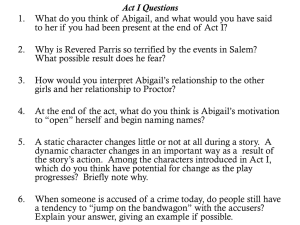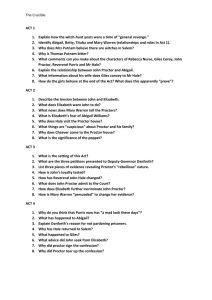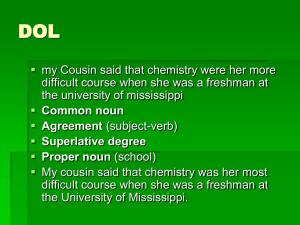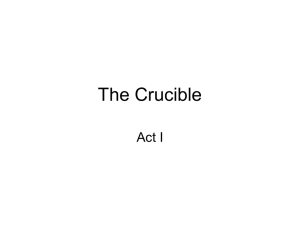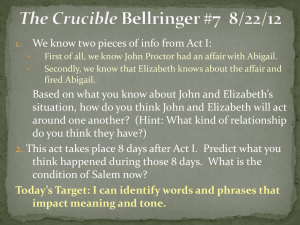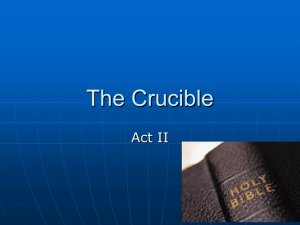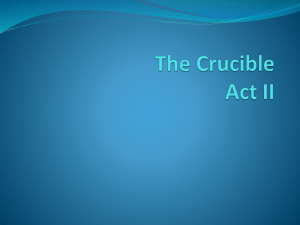The Crucible Act 1 & 2 Analysis: Study Guide
advertisement
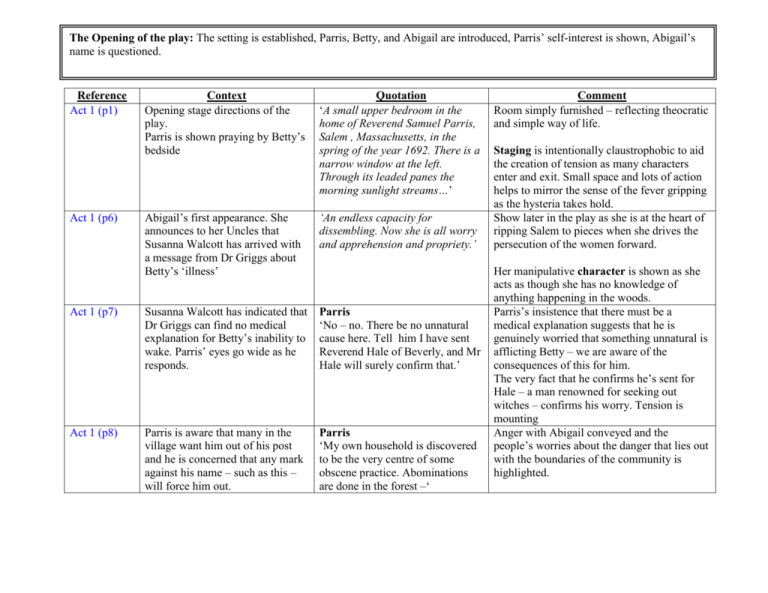
The Opening of the play: The setting is established, Parris, Betty, and Abigail are introduced, Parris’ self-interest is shown, Abigail’s name is questioned. Reference Act 1 (p1) Context Opening stage directions of the play. Parris is shown praying by Betty’s bedside Quotation ‘A small upper bedroom in the home of Reverend Samuel Parris, Salem , Massachusetts, in the spring of the year 1692. There is a narrow window at the left. Through its leaded panes the morning sunlight streams…’ Abigail’s first appearance. She announces to her Uncles that Susanna Walcott has arrived with a message from Dr Griggs about Betty’s ‘illness’ ‘An endless capacity for dissembling. Now she is all worry and apprehension and propriety.’ Act 1 (p7) Susanna Walcott has indicated that Dr Griggs can find no medical explanation for Betty’s inability to wake. Parris’ eyes go wide as he responds. Parris ‘No – no. There be no unnatural cause here. Tell him I have sent Reverend Hale of Beverly, and Mr Hale will surely confirm that.’ Act 1 (p8) Parris is aware that many in the village want him out of his post and he is concerned that any mark against his name – such as this – will force him out. Parris ‘My own household is discovered to be the very centre of some obscene practice. Abominations are done in the forest –‘ Act 1 (p6) Comment Room simply furnished – reflecting theocratic and simple way of life. Staging is intentionally claustrophobic to aid the creation of tension as many characters enter and exit. Small space and lots of action helps to mirror the sense of the fever gripping as the hysteria takes hold. Show later in the play as she is at the heart of ripping Salem to pieces when she drives the persecution of the women forward. Her manipulative character is shown as she acts as though she has no knowledge of anything happening in the woods. Parris’s insistence that there must be a medical explanation suggests that he is genuinely worried that something unnatural is afflicting Betty – we are aware of the consequences of this for him. The very fact that he confirms he’s sent for Hale – a man renowned for seeking out witches – confirms his worry. Tension is mounting Anger with Abigail conveyed and the people’s worries about the danger that lies out with the boundaries of the community is highlighted. Sentence Structure reveals P’s self preservation – repetition of ‘my ministry’ and placement of ‘your cousin’s life’ at the end indicates she is of less importance than his ministry. Act 1 (P8) Parris interrogates Abigail about the goings on in the woods. He challenges her about having seen someone dancing naked and she refutes this. Parris ‘Now tell me true, Abigail. And I pray you feel the weight of truth upon you, for now my ministry’s at stake, my ministry and perhaps your cousin’s life.’ Act 1 (p9) Parris asks Abigail how she is thought of in the village. There have been some whispers following her dismissal from the Proctor’s and nobody else has employed them. Abigail explains why she was discharged. Abigail ‘There be no blush about my name’ The importance of name is a key theme running throughout the play. This is a straight lie. Abigail It’s a bitter woman, a lying cold snivelling, woman, and I will not work for such a woman. Elizabeth is described before she is introduced in Act II. Abigail’s hatred towards her is suggested. We begin to see a reason for Abigail speaking out against Elizabeth later in the play. Act 1 (p9) Act I: The ‘witches’ meet: Abigail’s true manipulative nature is revealed, Mary Warren is shown to be a mouse. 2 Reference Act 1 (p14) Context Mercy suggests hitting Betty to wake her. Act I (p15) Mary warren arrives. She urges the Mercy Mary brings with her fear. This contrasts with others to confess. ‘what a grand peeping courage you her behaviour in Act II when she talks to have’ Proctor and when she is taken to speak out against the girls in court. Betty awakes momentarily and Betty shouts at Abigail. ‘You drank a charm to kill goody This emphasises Abigail’s hatred. This also Proctor’ sets Abigail’s story up for future use as it indicates that Abigail calls out against Elizabeth Proctor for her own gain. Act I (p15) Abigail is threatening Betty. Act 1 (p15) Evidence Abigail No, He’ll be comin’ up. Listen, now; if they be questioning us, tell them we danced – I told him as much already. Abigail ‘I will come to you in the black of some terrible night and I will bring a pointy reckoning that will shudder you’ I have seen some reddish work done at night, and I can make you wish you had never seen the sun go down! Comments Reveals Abigail’s self-preservation as Abigail does not stop hitting Mercy hitting Betty. Abigail stops Mercy hitting Betty so if Paris hears them he won’t know what they have done. This shows that Abigail is completely in control over betty, and clearly shows how evil Abigail can be. This brings in the themes of fear and evil. Act I: Proctor and Abigail together. 3 Reference Act 1 (p18) Context Abigail is talking to John. Evidence Act 1 (p18) Abigail is talking to John. Abigail ‘You are no wintry man. I know you, John. I know you. Act 1 (p18) Proctor sets Abigail in your place. Proctor ‘I will cut off my hand before I’ll ever reach for you again. Wipe it out of mind. We never touched Abby. Act 1 (p19) Abigail still lusts after John and she explains to him what their relationship meant to her. Abigail ‘I never knew what pretence Salem was, I never knew the lying lessons I was taught…’ Abigail ‘you clutched my back behind your house and sweated like a stallion whenever I come near’ Comment This indicates the physical nature of the relationship. Suggests Abigail feels that Proctor still likes Abigail a little. That Abigail feels she knows him well. Proctor had once warmed to her. Points to the present state of the Proctor’s relationship as he later tells Elizabeth that it is ‘winter yet’ in his house. Proctor makes it clear that he has no intension of going back to her. His tone is severe and forceful so Abigail will forget about it. Proctor has long been aware of the pretence of Salem and has told Abigail of the lack of Christian values. Act I (p19) Abigail still lusts after John. Abigail ‘And now you bid me tear the light out of my eyes? I will not, I cannot!’ The mention of light represents the goodness that Abigail sees in Proctor. Abigail is angry and refuses to give up on the idea that she may be with Proctor. Act I: Hale’s arrival Reference Act I (p22) Context Parris announces that Hale – a reverend from Beverly who is well versed in the processes for seeking out witches – is coming to Salem Act I (p22) Rebecca and Hale are introduced and they discuss what he is to do in the town. Act I (p32) As above. Evidence Rebecca ‘I think you best send Reverend Hale back as soon as he come. This will set us all to arguin’ again’ Rebecca ‘There is prodigious danger in the seeking of loose spirits. I fear it, I fear it. Let us blame ourselves and –‘ Hale Have no fear now – we shall find him out if he has come among us, and I mean to crush him utterly if he has shown his face!’ Comment Much wisdom in this comment. Indeed the whole process does set the community to arguing as they try to gain land and exact revenge. The danger is soon revealed at the end of the Act when Hale’s questioning of Tituba triggers a series of accusations. Rebecca is right to be frightened as she is later accused – fear is a key theme of the play. She is also right the community should ‘blame ourselves as they literally rip their community apart. Illustrates Hale’s determination and belief at the start. This changes dramatically as the play progresses. Act I: Tituba is accused and confesses, and the hysteria takes hold. Reference Act I (p36) Context Hale questions Tituba after Abi reveals that she conjured spirits. Evidence Tituba ‘No, no, don’t hang Tituba! I tell him I don’t desire to work for him, sir.’ Act I (p37) Tituba is confessing. Hale uses leading questions. Tituba ‘It was black dark, and I –‘ Act I (p39) Abigail has witnessed Tituba’s confession. Abigail ‘I want to open myself! I want the light of god, I want the sweet love of Jesus.’ Act 1 (p40) End of the Act. The first arrests are made. Hale Let the Marshall bring the irons Comments Tituba’s position as a slave makes her the perfect person for Abigail to accuse. Structure of questioning – deny, sense persecution as inevitable, confess, accuse others to save yourself – is introduced here and remain the same throughout the play. Tituba is playing for time. She didn’t see anything so she is unsure what to say/who to say she saw. Putnam mentions Goody Good and Goody Osborne so she takes advantage and mentions them. It is natural for Tituba to lie as she wishes to save her life. Hysteria takes hold. Abigail begins to take advantage and name other names This event will be repeated many times as the jails are filed. FEAR. The Opening of Act II: John and Elizabeth’s first scene together 6 Reference Act 2 (p41) Context First time Johns and Elizabeth are together in the play. Act II (p43) Elizabeth is telling John how she could not stop Mary going to Salem. Act II (p43) Elizabeth is explaining the extent of the town’s hysteria. Act II (p44) Elizabeth told John to go to Salem and speak against Abigail. Act II p45 Elizabeth is saying that she does not judge John Quotation Stage Directions ‘He lifts out the ladle and tastes. He is not quite pleased. He reaches to a cupboard, takes a pinch of salt, and drops it into the pot.’ Elizabeth ‘It is a mouse no more. I forbid her go, and she raises up her chin like the daughter of a prince and says to me, ‘I must go to Salem, Goody Proctor; I am an official of the court!” Elizabeth The town’s gone wild…she speak of Abigail, and I thought she were a saint, to hear her…where she walks the crowd part like the sea for Israel. Proctor ‘I am only wondering how I may prove what she told me Elizabeth. If the girl’s a saint now, I think it is not easy to prove she’s a fraud, and the town’s gone so silly.’ Elizabeth ‘The magistrate sits in your heart that judges you.’ Comment This representative of his dissatisfaction with his wife. Also highlights his willingness to please her as when he tastes the food he praises her on the quality of the seasoning. This reveals that Mary now has a great sense of importance; this establishes that all the children who are involved feel this way. The transformation is Mary is revealed in that she is compared to a mouse changing into ‘the daughter of a Prince. This emphasises her power over everyone. Allusion to the bible. Everyone believes her lies so it is hard for anyone to speak out against her. Highlights the hysteria that has gripped the town. This emphasises that John has a great sense of personal integrity. The Act II: Mary arrives home and reports that Elizabeth’s name is mentioned 7 Reference Act II (p48) Act II (p49) Act II (p50) Act II (p47) Act II (p51) Act II (p52) Context Proctor is criticising the methods used to determine who is a witch. Criticise the hanging of old women . Elizabeth name has been mentioned in court by Abigail Sarah good has confessed to witchcraft. Mary claims Sarah good tried to kill her. Elizabeth finding out her name mentioned in court. Proctor tries to reassure Elizabeth by saying this isn’t the case but we recognise, from Abigail’s earlier comments, that it is. John’s reluctance to go speak to the court Quotation Mary ‘they will not hang if they confess’ Comment Act II (p48)Shows Mary belief in that she isn’t doing wrong. Audience recognise the flaw in the questioning methods. ‘it’s god’s work we do’ Act II (p49)Shows Mary’s belief that the court is right. Again self-importance and delusion owing to the hysteria. Act II (p50) Fear of Abigail Elizabeth ‘Oh the noose, the noose is up’ Mary I never knew it before. I never knew any of it before…she sit there denying and denying and I feel a misty coldness creeping up my back, and I feel a clamp around my kneck and I cannot breathe air; and then I hear a voice Elizabeth ‘She’d dare not call out a farmer’s wife but there be monstrous profit in it. She thinks to take my place, John’ Elizabeth ‘She has an arrow in you yet John Proctor and you know it well!’ The power of mass hysteria is revealed as this climate of fear brings out strange feelings from the girls. Fear of Abigail and why Abigail is risking calling her name in court. Shows John still has feelings for Abigail or at least an influence on him. The Act II: Hale visits the Proctor’s home 8 Reference Act II (p52) Context Hale comes to Proctor’s house to tell them that Elizabeth’s name will be mentioned in court. Quotation Stage Directions ‘There is a quality of deference, even of guilt about his manner now.’ Comment This is the first indication that Hale is changing and that he is going against the court. He is taking a risk by going to the Proctor’s house without permission. Hale ‘I come of my own, without the court’s authority.’ Act II (p55) Act II (p56) Talking about commandments and the power of the court. Proctor is trying to prove a point, that nobody deserves to be hung. Hale ‘Theology, sir, is a fortress; no crack in a fortress may be accounted small.’ Things are getting awkward and Hale’s feeling worried. Proctor There are them that’ll swear to anything before they’ll hang; have you never thought of that?’ The atmosphere is tense as Proctor points out the flaws in the court’s methods. Abigail is in fact tearing the community apart at this stage. The Act II: Elizabeth is arrested and Proctor urges Mary Warren to go to court to speak out against Abigail. Reference Context Quotation Act II (p61) Cheever arrives to seek evidence against Elizabeth and Arrest her. Cheever ‘she testify it were your wife’s familiar spirit pushed it in’ Act II (p63) Defends his wife – argues with Cheever. Proctor ‘Is the accuser always holy now? Were they born this morning as clean as god’s fingers? I’ll tell them what’s walking Salem – vengeance is walking Salem.’ Proctor ‘Pontius Pilate! God will not let you wash your hands of this.’ Proctor ‘Good. Then her saintliness is done with. We will slide together into our pit; you will tell the court what you know. Proctor ‘Hell and heaven grapple on our backs, and all our old pretence is ripped away – make your peace!...we are only what we always were, but naked now. Aye naked! And the wind, God’s icy wind, will blow!’ Act II (p63) Act II (p66) Act II (p66) Proctor convinces Mary to go to the court to confess that it is all pretence. Mary explains that Abigail spoke of her affair. End of Act II Comment This highlights that Abigail is willing to use a range of acts associated with witchcraft to make her tales sound genuine. She has been particular manipulative to try to support the claims against Elizabeth. Proctor rightly questions this though it is very difficult to prove. Reference to the bible – calls Hale a traitor. At this point Hale doesn’t truly realise that he’s on the wrong side. Proctor is willing to give up his good name as his affair with Abigail will inevitably come out in court. He is happy to do this as it will bring Abi down and possibly save Elizabeth’s life. His strength and determination are revealed as Mary Weeps in the background. The Act III: Mary and John speak out against Abigail. Reference Context Quotation Comment Act III (p72) Proctor challenges the evidence Danforth ‘We burn a hot fire here; it melts down all concealment.’ Relates to the definition of what a crucible is. The irony is that the court encourages concealment and puts its full faith in the girls. Act III (p72) Cheever speaks of his visit to arrest Elizabeth in Act II Cheever ‘He damned the court and ripped your warrant.’ Proctor rips up his confession later – again to show his anger at the proceedings and lack of faith in the court. Act III (p73) Hale challenges Danforth Hale ‘I cannot think you may judge the man on such evidence’ The change in Hale is shown as he begins to recognise that the evidence is flawed. Danforth ‘I have seen marvels in this court. I have seen people choked before my eyes by spirits; I have seen them struck by pins and slashed with daggers. I have until this moment not the slightest reason to suspect that the children may be deceiving me’. Proctor ‘These are my friends. There wives are also accused’ Ironic as he has not ‘seen’ anything. This long list highlights the full range of deceits that have taken place. Abigail Angry tone in Abigail’s dialogue. Act III (p73) Act III (p74) Act III (p87) Danforth reveals Elizabeth’s pregnancy and that she will be allowed to live a month – by which point the hysteria may have died down. Abi feels threatened but shows her Shows Proctor’s personal integrity as, despite the chance his wife will be safe because of her pregnancy, he looks to save the other accused by challenging Abigail. power and confidence by challenging Danforth. I done my duty pointin’ out the devil’s people and this is my reward! To be mistrusted, denied, questioned lie a –‘ ‘Think you be so mighty that the power of hell may not turn your wits? Beware of it!’ She directly threatens Danforth. She is forceful in her accusations. The Act III: Proctor calls Abigail for a whore. Elizabeth lies, Abigail diverts attention from her through the ‘bird’ incident, Hale defends the Proctors and denounces the court. Reference Context Quotation Comment Act III (p89) Proctor has just revealed that he has committed lechery. Proctor ‘I have made a bell of my honour! I have rung the doom of my good name – you will believe me, Mr Danforth!’ Proctor emphasises the extent of his sacrifice – he has lost his good name. The importance of a name is dealt with in the final scene. Act III (p89) Proctor believes Elizabeth will tell the truth in court. Proctor ‘In her life, sir, she have never lied.’ Important as Elizabeth does lie in this situation. This leads to both Proctor and his wife being condemned. Act III (p91) Elizabeth has just left the court room; she has lied about Proctor committing lechery. Hale ‘Excellency, it is a natural lie to tell: I beg you stop now before another is condemned! I may shut my conscience to it no more – private vengeance is working through this testimony…’ Hale strongly objects to the way in which proctor is treated and accurately sums up the situation - private vengeance is at work. Act III (p92) Abigail diverts attention from Mary’s accusations. Abigail ‘Oh Mary this is a black art to change your shape. No, I cannot, I cannot stop my mouth; it’s god’s work I do.’ Exploits her knowledge of the things that a witch would be expected to do/exploits the lack of need for clear evidence. Repetition to highlight the hysteria Act III (p94) Abigail says she see’s Mary as a bird. Builds to hysteria and shows that Abigail is in Mary, Abigail and the girls Repetition of what Mary says ‘stop control. it!’ etc Act III (p96) Abigail has control over Mary. Proctor ‘A fire, a fire is burning! I hear the boot of Lucifer, I see his filthy face! And it is my face and yours Danforth! Danforth believes the girls and it shows that anger of Proctor. The irony of Abigail saying she is in heaven now, whereas heaven is being pulled down. ‘You are pulling down heaven and raising up a whore’ Act III (p96) Hale ends the court meeting. Hale ‘I denounce these proceedings, I quit this court!’ Proctors was found guilty. The Act IV: Change in attitude of Parris, Hale feels guilt and urges people to save their lives by falsely confessing, Hale goes to Elizabeth to ask her to beg John to confess. Reference Context Quotation Comment Act IV (p97) Falling Action following the frenzied courtroom scene. Proctor is in jail Parris and Hale together These characters were completely opposed in Act III. The fact that they are together now suggests a dramatic change in the attitude of Parris. He feels guilty and looks to Hale to save the persecuted. Act IV (p105) In conversation with Elizabeth. Hale I would save your husband’s live, for if he is taken I count myself his murderer. Do you understand me? Underlines Hale’s guilt and change in character. Act IV (p106) As above Hale ‘Let you not mistake my duty as I mistook my own. I came into this village like a bridegroom to his beloved, bearing gifts of high religion the very crowns of holy law I brought, and what I touched with my bright confidence – It died and where I turned the eye of my great faith, blood flowed up.’ Simile reveals that he saw the seeking out of witches as a happy quest/ an opportunity to test the theories in his books. Religion was exploited to do evil/persecute the good. ‘Life is god’s most precious gift’. Rule by the church = theocracy The Act IV: The end – John has his goodness as, though he initially confesses, he will not let them have his name. Reference Context Act IV (p109) Discusses the option of lying to save his life with Elizabeth. Act IV (P109) As above Act IV (p112) Act IV (p113) Proctor turns from Elizabeth to Hathorne Danforth had asked him to name names just as the others did when they confessed. Act IV (p115) He had signed a confession but refuses to have it nailed on the church door. He tears it up. Quotation Comment Proctor ‘I cannot mount the gibbet like a saint. It is a fraud. I am not that man.’ Elizabeth ‘whatever you will do it is a good man does it.’ Proctor acknowledges that he has flaws. Proctor ‘I want my life’ Proctor I speak my own sins; I cannot judge another. I have no tongue for it.’ Proctor ‘Because it is my name! Because I cannot have another in my life! Because I lie and sign myself to lies…I have given my soul; leave my name!’ Confirms that he will lie. Life turns out to be less important. His goodness/Personal Integrity are shown as he won’t name others. She shows forgiveness and acknowledges his goodness. Repetition of ideas, stresses and importance of a name. Admits he lied. Act IV (p115-116) Act IV (p116) Final line of the play. Danforth calls for the Marshall. Hale begs him not to condemn himself. Final Line Proctor ‘You have made your magic now, for now I do think I see some shred of goodness in John Proctor. Not enough to weave a banner with, but white enough to keep it from such dogs,’ Elizabeth ‘He have his goodness now. God forbid I take it from him!’ Having overcome adversity, Proctor sees his goodness. Metaphor suggests he acknowledges that his flaws remain.. ‘white’ connotes goodness. Confirms that good has overcome evil and the community has risen against the corrupt authority.

